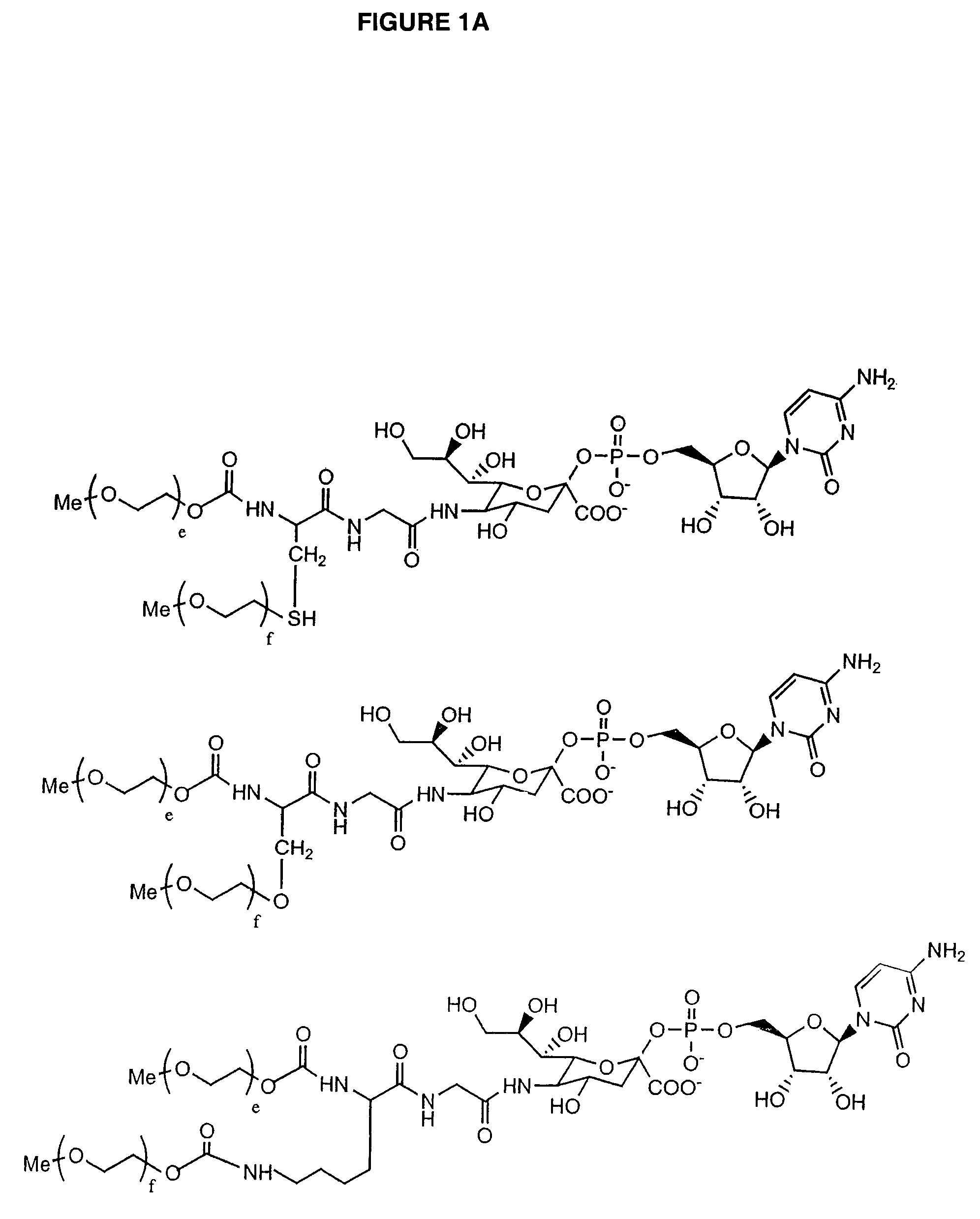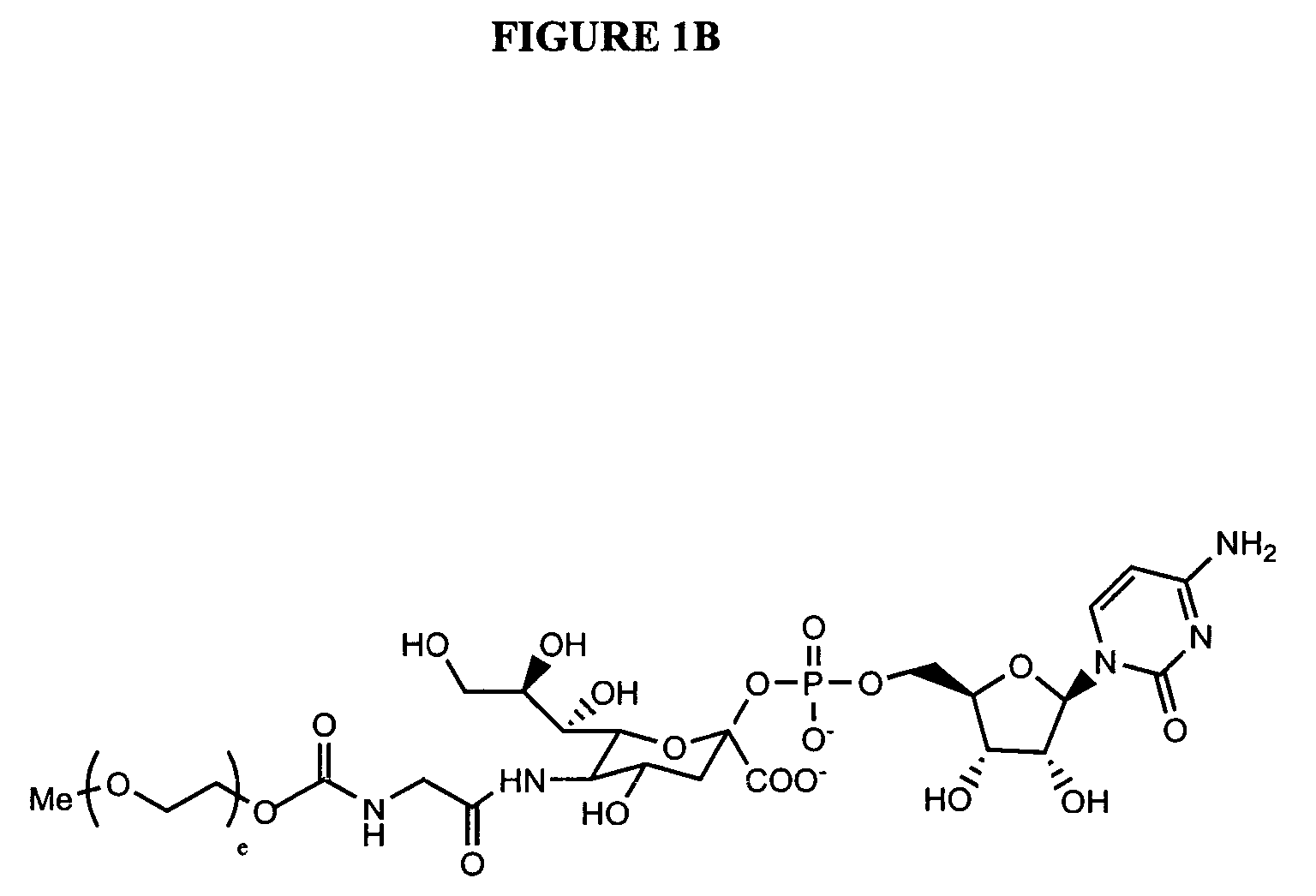Glycopegylated granulocyte colony stimulating factor
a technology of granulocyte colony and glycopegylated granulocytes, which is applied in the direction of drug compositions, peptide/protein ingredients, extracellular fluid disorder, etc., can solve the problem of dose-dependent bone pain, lack of homogeneity of the final product, and the possibility of reducing the biological or enzymatic activity of the peptid
- Summary
- Abstract
- Description
- Claims
- Application Information
AI Technical Summary
Benefits of technology
Problems solved by technology
Method used
Image
Examples
example 1
GlycoPEGylation of G-CSF Produced in CHO Cells
a. Preparation of Asialo-Granulocyte-Colony Stimulation Factor (G-CSF)
[0400]G-CSF produced in CHO cells was dissolved at 2.5 mg / mL in 50 mM Tris 50 mM Tris-HCl pH 7.4, 0.15 M NaCl, 5 mM CaCl2 and concentrated to 500 μL in a Centricon Plus 20 centrifugal filter. The solution was incubated with 300 mU / mL Neuraminidase II (Vibrio cholerae) for 16 hours at 32° C. To monitor the reaction a small aliquot of the reaction is diluted with the appropriate buffer and an IEF gel was run. The reaction mixture is then added to prewashed N-(p-aminophenyl)oxamic acid-agarose conjugate (800 μL / mL reaction volume) and the washed beads gently rotated for 24 hours at 4° C. The mixture was centrifuged at 10,000 rpm and the supernatant was collected. The beads were washed 3 times with Tris-EDTA buffer, once with 0.4 mL Tris-EDTA buffer and once with 0.2 mL of the Tris-EDTA buffer and all supernatants were pooled. The supernatant was dialyzed at 4° C. against ...
example 2
Two Enzyme Method in Two Pots
[0405]The following example illustrates the preparation of G-CSF-GalNAc-SA-PEG in two sequential steps wherein each intermediate product is purified before it is used in the next step.
a. Preparation of G-CSF-GalNAc (pH 6.2) from G-CSF and UDP-Ga / NAc using GalNAc-T2.
[0406]G-CSF (960 mcg) in 3.2 mL of packaged buffer was concentrated by utrafiltration using an UF filter (MWCO 5K) and then reconstituted with 1 mL of 25 mM MES buffer (pH 6.2, 0.005% NaN3). UDP-GalNAc (6 mg, 9.24 mM), GalNAc-T2 (40 μL, 0.04 U), and 100 mM MnCl2 (40 μL, 4 mM) were then added and the resulting solution was incubated at room temperature.
[0407]After 24 h, MALDI indicated the reaction was complete. The reaction mixture was directly subjected to HPLC purification using SEC (Superdex 75 and Superdex 200) and an elution buffer comprising of PBS (phosphate buffered saline, pH 4.9 and 0.005% Tween 80). The collected peak of G-CSF-GalNAc was concentrated using a Centricon 5 KDa MWCO fil...
example 3
One Pot Method to Make G-CSF-GalNAc-SA-PEG with Simultaneous Addition of Enzymes
[0409]The following example illustrates the preparation of G-CSF-GalNAc -SA-PEG in one pot using simultaneous addition of enzymes
a. One Potprocess Using Mouse ST6GalNAc-I (pH 6.0).
[0410]G-CSF (960 μg of protein dissolved in 3.2 mL of the product formulation buffer) was concentrated by ultrafiltration (MWCO 5K) to 0.5 mL and reconstituted with 25 mM MES buffer (pH 6.0, 0.005% NaN3) to a total volume of about 1 mL or a protein concentration of 1 mg / mL. UDP-GalNAc (6 mg, 9.21 μmol), GalNAc-T2 (80 μL, 80 mU), CMP-SA-PEG (20 KDa) (6 mg, 0.3 μmol) and mouse enzyme ST6GalNAc-I (120 μL) and 100 mM MnCl2(50 μL) were then added. The solution was rocked at 32° C. for 48 h and purified using standard chromatography conditions on SP-Sepharose. A total of 0.5 mg of protein (A280) was obtained or about a 50% overall yield. The product structure was confirmed by analysis with both MALDI and SDS-PAGE.
b. One Pot Process U...
PUM
| Property | Measurement | Unit |
|---|---|---|
| molecular weight | aaaaa | aaaaa |
| molecular weight | aaaaa | aaaaa |
| effective radius | aaaaa | aaaaa |
Abstract
Description
Claims
Application Information
 Login to View More
Login to View More - R&D
- Intellectual Property
- Life Sciences
- Materials
- Tech Scout
- Unparalleled Data Quality
- Higher Quality Content
- 60% Fewer Hallucinations
Browse by: Latest US Patents, China's latest patents, Technical Efficacy Thesaurus, Application Domain, Technology Topic, Popular Technical Reports.
© 2025 PatSnap. All rights reserved.Legal|Privacy policy|Modern Slavery Act Transparency Statement|Sitemap|About US| Contact US: help@patsnap.com



